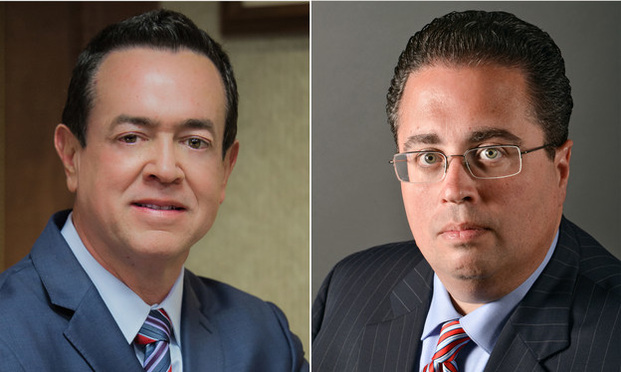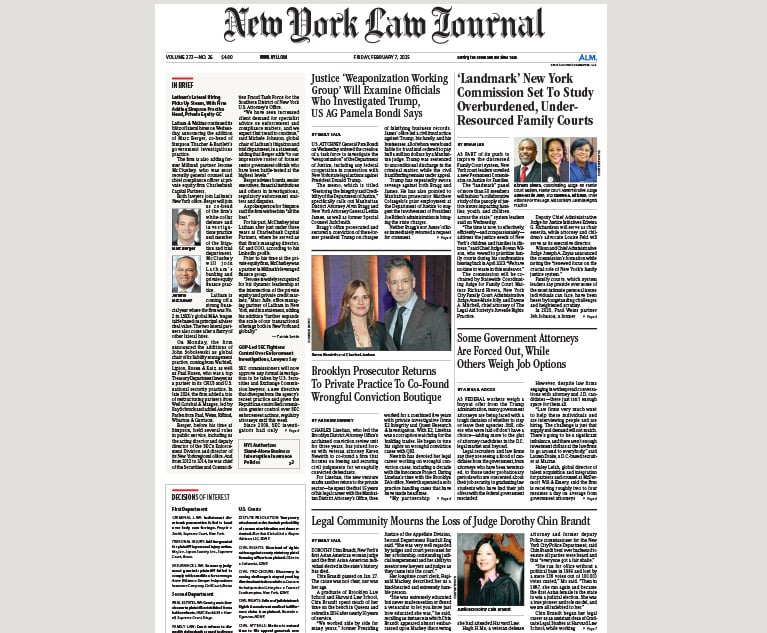PI Firm Accused of Client-Poaching Says Allegations Don't Hold Water
William Schwitzer & Associates and solo practitioner Rene Garcia are arguing the suit against them is missing key details, requiring its dismissal.
April 15, 2019 at 05:35 PM
4 minute read
 Joseph Ginarte of Ginarte Gallardo Gonzalez Winograd and Clifford Robert of Robert & Robert.
Joseph Ginarte of Ginarte Gallardo Gonzalez Winograd and Clifford Robert of Robert & Robert.
William Schwitzer & Associates, a New York-area personal injury law firm that was sued by a rival firm for allegedly poaching its clients in a doctor's office, told a New York state court Friday that its competitor's evidence has violated court rules.
Joseph Ginarte's firm raised eyebrows when it filed a complaint last year accusing William Schwitzer & Associates name partner William Schwitzer and his firm of using non-attorney runners to trawl a Manhattan medical waiting room and entice Ginarte clients to switch firms. Ginarte Gallardo Gonzalez Winograd also revealed last month that its paralegal Juan Flores Hernandez pretended to be a prospective client and recorded conversations with runners and Schwitzer lawyers.
Schwitzer and his firm, defended by Gibson, Dunn & Crutcher partner Randy Mastro, have denied the claims, seeking to dismiss the suit, and have accused the Ginarte firm of defamation.
In court papers Friday, the Schwitzer firm and several of its lawyers said the Ginarte firm's own affidavits and phone records don't support its arguments, while its anonymous affidavits broke court rules. The Schwitzer firm said they were clearly filed to stir up media attention.
In the Friday court papers in Manhattan Supreme Court, Schwitzer & Associates took shots at Ginarte for having had a paralegal bluff his way into the firm's offices with a phony injury. The paralegal played secret agent, but he didn't actually uncover any wrongdoing, the Schwitzer firm and its co-defendants argued.
“It is now clear from Ginarte's extensive exhibits and its 'Keystone Cop' effort to entrap the Schwitzer defendants with an undercover sting operation by one of its paralegals that Ginarte has not a shred of evidence” to support its claim that Schwitzer's lawyers defamed Ginarte in meetings with potential clients, the firm said.
The Schwitzer defendants further argue that the Ginarte firm filed anonymous client affidavits that were redacted without sealing requests, so the affidavits should be ignored. Even if they are to be believed, Schwitzer and his lawyers said, the affidavits don't evidence any tortious interference on their part, just as the paralegal's recording didn't show defamation. The defendants strenuously denied any connection to the alleged runners.
The Schwitzer defendants contend that several Ginarte clients ultimately didn't switch lawyers, meaning there wasn't any injury to the Ginarte firm and thus nothing to sue over. The Schwitzer defendants point out that Ginarte only has documents related to one client who was allegedly convinced to switch lawyers.
But Clifford Robert of Robert & Robert, who represents the Ginarte firm, said in a statement that it is “absurd” to think his team could have obtained evidence from clients who switched to the Schwitzer's firm, as it would have been unethical for his client to approach Schwitzer clients. “As Mr. Schwitzer should know, contacting the clients of another attorney is prohibited by the New York Rules of Professional Conduct,” he said. “In fact, claims of improper contact with the clients of another attorney is at the heart of this case.”
Rene Garcia, a solo practitioner who was also sued and is represented by Walden Macht & Haran, made many of the same arguments in seeking dismissal of the suit. When the complaint against him is boiled down, Garcia said, it is only alleged that he shared office space with the Schwitzer firm and that three Ginarte clients who went to the same doctor's office switched from the Ginarte firm to Garcia's. Key details are missing, Garcia said.
“This silence speaks volumes,” Garcia argued.
Georgia Winston, an attorney for Garcia and his firm, said there was “no merit” to the claims against her clients and expressed confidence that they would be vindicated.
An argument date has not been set on the dismissal motions.
This content has been archived. It is available through our partners, LexisNexis® and Bloomberg Law.
To view this content, please continue to their sites.
Not a Lexis Subscriber?
Subscribe Now
Not a Bloomberg Law Subscriber?
Subscribe Now
NOT FOR REPRINT
© 2025 ALM Global, LLC, All Rights Reserved. Request academic re-use from www.copyright.com. All other uses, submit a request to [email protected]. For more information visit Asset & Logo Licensing.
You Might Like
View All
Lawyers Across Political Spectrum Launch Public Interest Team to Litigate Against Antisemitism
4 minute read
'A Shock to the System’: Some Government Attorneys Are Forced Out, While Others Weigh Job Options
7 minute read
Haynes and Boone Expands in New York With 7-Lawyer Seward & Kissel Fund Finance, Securitization Team
3 minute readTrending Stories
- 1Parties’ Reservation of Rights Defeats Attempt to Enforce Settlement in Principle
- 2ACC CLO Survey Waves Warning Flags for Boards
- 3States Accuse Trump of Thwarting Court's Funding Restoration Order
- 4Microsoft Becomes Latest Tech Company to Face Claims of Stealing Marketing Commissions From Influencers
- 5Coral Gables Attorney Busted for Stalking Lawyer
Who Got The Work
J. Brugh Lower of Gibbons has entered an appearance for industrial equipment supplier Devco Corporation in a pending trademark infringement lawsuit. The suit, accusing the defendant of selling knock-off Graco products, was filed Dec. 18 in New Jersey District Court by Rivkin Radler on behalf of Graco Inc. and Graco Minnesota. The case, assigned to U.S. District Judge Zahid N. Quraishi, is 3:24-cv-11294, Graco Inc. et al v. Devco Corporation.
Who Got The Work
Rebecca Maller-Stein and Kent A. Yalowitz of Arnold & Porter Kaye Scholer have entered their appearances for Hanaco Venture Capital and its executives, Lior Prosor and David Frankel, in a pending securities lawsuit. The action, filed on Dec. 24 in New York Southern District Court by Zell, Aron & Co. on behalf of Goldeneye Advisors, accuses the defendants of negligently and fraudulently managing the plaintiff's $1 million investment. The case, assigned to U.S. District Judge Vernon S. Broderick, is 1:24-cv-09918, Goldeneye Advisors, LLC v. Hanaco Venture Capital, Ltd. et al.
Who Got The Work
Attorneys from A&O Shearman has stepped in as defense counsel for Toronto-Dominion Bank and other defendants in a pending securities class action. The suit, filed Dec. 11 in New York Southern District Court by Bleichmar Fonti & Auld, accuses the defendants of concealing the bank's 'pervasive' deficiencies in regards to its compliance with the Bank Secrecy Act and the quality of its anti-money laundering controls. The case, assigned to U.S. District Judge Arun Subramanian, is 1:24-cv-09445, Gonzalez v. The Toronto-Dominion Bank et al.
Who Got The Work
Crown Castle International, a Pennsylvania company providing shared communications infrastructure, has turned to Luke D. Wolf of Gordon Rees Scully Mansukhani to fend off a pending breach-of-contract lawsuit. The court action, filed Nov. 25 in Michigan Eastern District Court by Hooper Hathaway PC on behalf of The Town Residences LLC, accuses Crown Castle of failing to transfer approximately $30,000 in utility payments from T-Mobile in breach of a roof-top lease and assignment agreement. The case, assigned to U.S. District Judge Susan K. Declercq, is 2:24-cv-13131, The Town Residences LLC v. T-Mobile US, Inc. et al.
Who Got The Work
Wilfred P. Coronato and Daniel M. Schwartz of McCarter & English have stepped in as defense counsel to Electrolux Home Products Inc. in a pending product liability lawsuit. The court action, filed Nov. 26 in New York Eastern District Court by Poulos Lopiccolo PC and Nagel Rice LLP on behalf of David Stern, alleges that the defendant's refrigerators’ drawers and shelving repeatedly break and fall apart within months after purchase. The case, assigned to U.S. District Judge Joan M. Azrack, is 2:24-cv-08204, Stern v. Electrolux Home Products, Inc.
Featured Firms
Law Offices of Gary Martin Hays & Associates, P.C.
(470) 294-1674
Law Offices of Mark E. Salomone
(857) 444-6468
Smith & Hassler
(713) 739-1250







